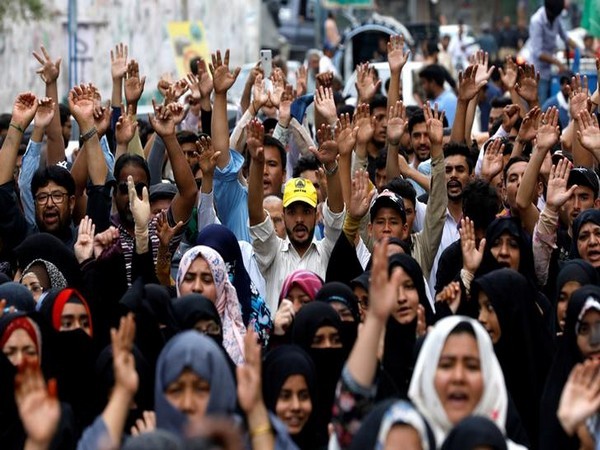
Pakistani Shi'ite supporters of Imamia Students Organization (ISO) rise their hands as they chant slogans to condemn the Friday's blast at vegetable market in Quetta, during a protest in Karachi, Pakistan April 14, 2019. REUTERS/Akhtar Soomro
Islamabad, Pakistan: The Karachi police arrested dozens of protesters, including women, who were staging a sit-in outside the Sindh Assembly against the abduction of the two missing students, The Express Tribune newspaper reported.
Subsequently, several rights groups had called for the release of swift accountability for the use of excessive force at the protest.
“Amnesty International strongly condemns the use of excessive force by the police to disperse peaceful protesters at a sit-in against the enforced disappearance of two Baloch students outside the Sindh Assembly in Karachi,” the London-based group said in a Twitter post.
“Violently cracking down on families demanding answers to the whereabouts of their loved ones only compounds the cruelty of the heinous practice of enforced disappearances,” the group added.
According to Pakistan media reports, authorities’ heavy-handed approach against Baloch protesters went gone viral on social media as people call for action to be taken against police brutality.
Sanaullah Baloch, a member of the Balochistan Assembly, condemned the Sindh police’s “inhuman act of violence against the innocent and peaceful protesters.”
Prominent journalist Hamid Mir said the violence against the protestors was “unfortunate and unacceptable”.
Human rights activists allege that the law enforcement agencies in Pakistan are responsible for the cases of forced disappearance in Pakistan.
Enforced disappearances are used as a tool by Pakistani authorities to terrorize people who question the all-powerful army establishment of the country, or seek individual or social rights.
Cases of enforced disappearances have been majorly recorded in the Balochistan and the Khyber-Pakhtunkhwa provinces of the country which host active separatist movements.
“The – already controversial – film ‘The Kashmir Files’, which will be shown on Friday 17 June in Pathe Buitenhof 20 in The Hague, does provide a realistic picture of what happened on 19 January 1990 when the genocide in Kashmir took place,” the statement read.
“We, Kashmiri Pandits, have a rich and unique culture rooted in a sophisticated philosophy, namely ‘Kashmiri Shaivism’. Kashmiri Pandits have a written history of over 3000 years; unique musical genres and instruments; language (Kashmiri) with its own script (Sharda) and an extensive collection of historical and early modern literature,” it read further.
“The film will also be screened in the United States, Germany and the United Kingdom in the coming months. In the latter country, Prime Minister Boris Johnson has invited the two makers of the film to tell their story in the British Parliament. Various Muslim organizations oppose the film screenings in the different countries, including the Scottish Muslim Council in the United Kingdom,” the statement added further.
‘The Kashmir Files,’ on the life of Kashmiri pandits during the 1990 Kashmir insurgency, is based on first-generation video interviews of victims of the Kashmiri massacre, making an account of their pain, suffering, struggle and trauma.
The hard-hitting film starred Anupam Kher, Pallavi Joshi, Mithun Chakraborty, Darshan Kumaar, Puneet Issar, Mrinal Kulkarni, and others. It had crossed Rs 200-crore mark at the box office within two weeks of its release.






